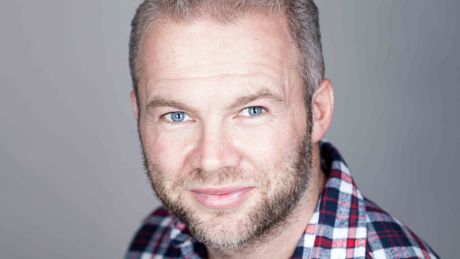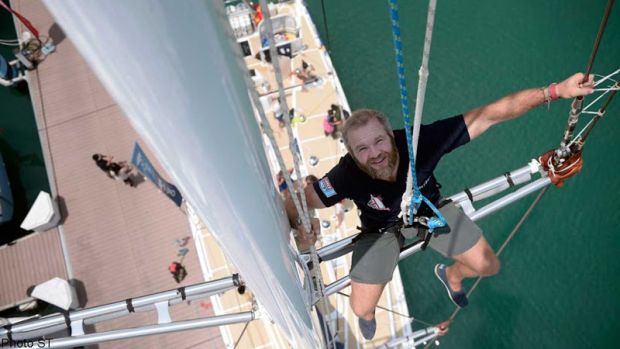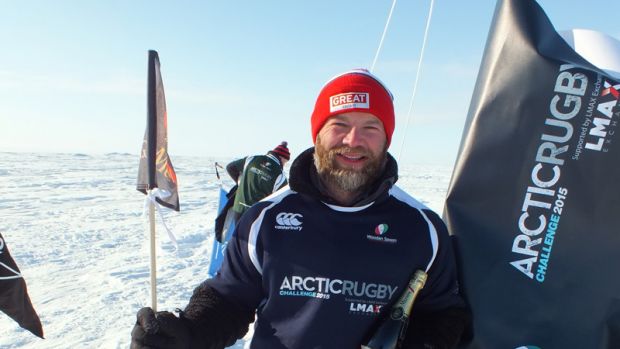Ollie Phillips: “I Had to Accept My Career Was Over”
Ollie Phillips was once the best rugby sevens player in the world – until an injury stopped him. But that hasn't taken away his motivation

In 2009, Ollie Phillips was living the dream. Voted “Best Rugby Sevens Player in the World” as England captain, he was riding high on international sporting success – until a crippling, career-ending injury. That forced him to make a decision: wallow in self-pity and reminisce about the glory days, or get out there and find a new way to get the adrenaline pumping. No prizes for guessing which path he chose.
Now a highly successful businessman at PwC, a commentator, an adventurer, an expedition leader, a World Record Holder for the most northerly rugby match (he played a game at the North Pole), we ask him: how on Earth do you find the time to juggle everything and stay in shape?
You’re a sports commentator, adventurer, businessman, former international rugby player… what time is your alarm set for in the morning?
I’m a 6am man. With my background in sport I’m still desperate to stay fit, and if I don’t exercise it drives me crackers, so I’ll get straight up and into the gym to train. Really, that time in the morning is the only time I can definitely commit to working out without anything else getting in the way.
So the age-old excuse of “I’m too busy to work out” – how does that sit with you?
It’s different strokes for different folks. What motivates me is exercise, but I don’t expect everyone to think the same way. You need the balance, and maybe I’m at the extreme end. Equally, I think one area that I’m lacking in is reading and literature. People will read before bed or in the morning, and I probably fall short in that respect and overinvest in fitness. People who totally ignore fitness, though, they’re missing a trick. You’re not looking after your body – the one core asset that allows you to do everything and anything you need to do. The key to training, and the key to doing anything in life, is getting the ball rolling.

During your international rugby career, you were voted Best Sevens Player In The World by your peers, but who was the most formidable opponent you came up against?
I certainly handled the challenge better as I grew older, but I was definitely more nervous facing certain players when I was young. With age and experience comes familiarity of the situations and surroundings, and confidence to just have a go. Probably the most unnerving was being 18 and playing against [New Zealand’s] Jonah Lomu. He was in his prime, and I was such a huge fan of his. I’d seen him on the telly and suddenly I was lining up against him. Insane. I was 13 stone soaking wet, against this 6ft 4in monster. The other was Sonny Bill Williams [also of NZ]. He was an enigma and had come from rugby league, and he was massive and had so much talent.
Do you have any motivational heroes?
I was very lucky to play for Newcastle Falcons alongside Jonny Wilkinson. I think he is an obsessive, perhaps too much. He demonstrated the level of commitment you needed to be the best, and he demonstrated how far you could push your body. I think he also showed that you could go too far – that once it becomes an obsession, it becomes a weight on your shoulders. You become a constant critic of yourself, and end up not enjoying what you do. When that happens, what’s the point?
What’s the last book you read that motivated you to do something amazing?
Before every England tournament I played in, I used to read a book called Decide To Win: A Total Approach To Winning In Sport And Life by Rex Johnson and David Swindley. It’s all about committing to being the best, committing to it, focussing on success and being a glass-half-full guy. It’s brilliant, I still have it somewhere.
Sign up for workout ideas, training advice, reviews of the latest gear and more.
How did you keep your head up after you were told a calf injury would end your professional rugby career?
That was hard. They were my darkest times, because every other injury had a timeline to recovery. With this one, I severed a nerve in my calf while preparing for the World Cup. One day I could be running fine, and the next it just wouldn’t work. When the experts tell you they can’t figure it out and make you better, dealing with that is really hard. I had to accept my career, my great passion, was over. You get a choice – you either reflect on the good old times and get down about how you can’t have them again, or embrace a new challenge, ones that’s out of your comfort zone and will enrich you. I chose the latter, and went in head first.

What did you learn about yourself while sailing the globe as a total newcomer to the sport?
That was incredible. It was a totally unfamiliar environment for me and I had never sailed before, with other people who had no experience either. Of course, there was an aim to win races, but I soon realised that everyone around me had a different drive to complete the challenge. Somebody was on board because they’d sailed around the world years before in the Navy and wanted to prove they could still do it, another wanted to complete it in honour of their husband who’d passed away. I guess it taught me that winning isn’t just about triumphing over an opponent.
What’s the next big adventure?
Oh, there’s a lot on the horizon. I’ve got four big challenges for 2016: I’m fronting The Great British Row for Cancer Research, where I’ll be rowing a marathon; I’ll follow that up by running the London Marathon; in June I’ll climb Mount Blanc; and then I’ll do Kilimanjaro. In 2018, I’m gearing up to break a world record and climb all seven summits and the two poles, in under 160 days. As you can imagine, my mum is totally over the moon about all of that.
Craft beer drinker, Devonian, fisherman and former content director of Coach online, Chris contributed style coverage and features between 2016 and 2019.
